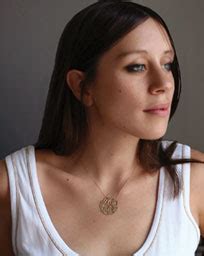A Quote by Henry James
To live only to suffer—only to feel the injury of life repeated and enlarged—it seemed to her she was too valuable, too capable, for that. Then she wondered if it were vain and stupid to think so well of herself. When had it even been a guarantee to be valuable? Wasn't all history full of the destruction of precious things? Wasn't it much more probable that if one were fine one would suffer?
Related Quotes
Melanctha Herbert was always losing what she had in all the things she saw. Melanctha was always being left when she was not leaving others. Melanctha Herbert always loved too hard and much too often. She was always full with mystery and subtle movements and denials and vague distrusts and complicated disillusions. Then Melanctha would be sudden and impulsive and unbounded in some faith, and then she would suffer and be strong in her repression. Melanctha Herbert was always seeking rest and quiet and always she could only find new ways to be in trouble.
On some such night as this she remembered promising to herself to live as brave and noble a life as any heroine she ever read or heard of in romance, a life sans peur et sans reproche; it had seemed to her then that she had only to will, and such a life would be accomplished. And now she had learnt that not only to will, but also to pray, was a necessary condition in the truly heroic. Trusting to herself, she had fallen.
She suffers as a miser. She must be miserly with her pleasures, as well. I wonder if sometimes she doesn't wish she were free of this monotonous sorrow, of these mutterings which start as soon as she stops singing, if she doesn't wish to suffer once and for all, to drown herself in despair. In any case, it would be impossible for her: she is bound.
She realized how many of her beliefs were either unrealistic or belonged to her deceased parents and her ex-husband. She also realized that her expectations for herself and others were sometimes too rigid. She was trying to live up to what everyone else said was best for her, which made her depressed and hard to be around at times. Once she changed her beliefs about herself and others, she began to smile more and enjoy life.
It was the peculiar artifice of Habit not to suffer her power to be felt at first. Those whom she led, she had the address of appearing only to attend, but was continually doubling her chains upon her companions; which were so slender in themselves, and so silently fastened, that while the attention was engaged by other objects, they were not easily perceived. Each link grew tighter as it had been longer worn; and when by continual additions they became so heavy as to be felt, they were very frequently too strong to be broken.
Why, i' faith, methinks she's too low for a high praise, too brown for a fair praise and too little for a great praise: only this commendation I can afford her, that were she other than she is, she were unhandsome; and being no other but as she is, I do not like her. (Benedick, from Much Ado About Nothing)
She didn't feel thirty. But then again again, what was being thirty supposed to feel like? When she was younger, thirty seemed so far away, she thought that a woman of that age would be so wise and knowledgeable, so settled in her life with a husband and children and a career. She had none of those things. She still felt as clueless as she had felt when she was twenty, only with a few more gray hairs and crow's feet around her eyes.
Were all first loves like that? Somehow she doubted it; even now it struck her as being more real than anything she'd ever known. Sometimes it saddened her to think that she'd never experience that kind of feeling again, but then life had a way of stamping out that intensity of passion; she'd learned all too well that love wasn't always enough.
It had been an awful thing to lose Henry the first time, to matrimony, but to discover what a false front he was capable of was another kind of blow, and it had left her almost speechless. Then there was the fury with herself—for she had known what Henry’s love was, and still she had gone back to suffer a little more at his hands.
The difficulty will be to keep her from learning too fast and too much. She is always sitting with her little nose burrowing into books. She doesn't read them, Miss Minchin; she gobbles them up as if she were a little wolf instead of a little girl. She is always starving for new books to gobble, and she wants grown-up books--great, big, fat ones--French and German as well as English--history and biography and poets, and all sorts of things. Drag her away from her books when she reads too much.
She rested her head against his and felt, for the first time, what she would often feel with him: a self-affection. He made her like herself. With him, she was at ease; her skin felt as though it was her right size.. It seemed so natural, to talk to him about odd things. She had never done that before. The trust, so sudden and yet so complete, and the intimacy, frightened her.. But now she could think only of all the things she yet wanted to tell him, wanted to do with him.
Yet there were times when he did love her with all the kindness she demanded, and how was she to know what were those times? Alone she raged against his cheerfulness and put herself at the mercy of her own love and longed to be free of it because it made her less than he and dependent on him. But how could she be free of chains she had put upon herself? Her soul was all tempest. The dreams she had once had of her life were dead. She was in prison in the house. And yet who was her jailer except herself?
He’d never be able to touch her, and as passionate as she was, she would eventually need a man who could. He’d never had to worry about these things before because he’d never been with a woman. Not even before his possession. He’d been too busy then, too involved in his job. Maybe he needed to join Workaholics Anonymous, he thought dryly. He had to be the only millennia-old virgin in history.
She wondered whether there would ever come an hour in her life when she didn't think of him -- didn't speak to him in her head, didn't relive every moment they'd been together, didn't long for his voice and his hands and his love. She had never dreamed of what it would feel like to love someone so much; of all the things that had astonished her in her adventures, that was what astonished her the most. She thought the tenderness it left in her heart was like a bruise that would never go away, but she would cherish it forever.
In this moment she felt that she had been robbed of an enormous number of valuable things, whether material or intangible: things lost or broken by her own fault, things she had forgotten and left in houses when she moved: books borrowed from her and not returned, journeys she had planned and had not made, words she had waited to hear spoken to her and had not heard, and the words she meant to answer with. . . .






































